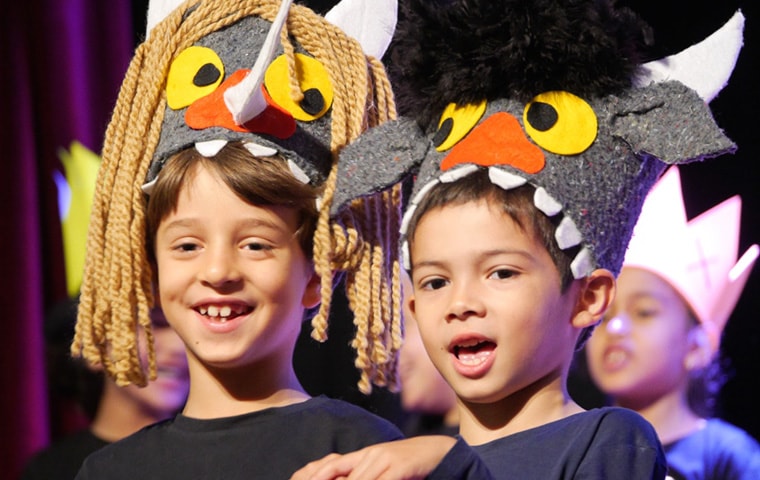
What does the Drama and Music provision cover at Kings’ Dubai?
Creativity, Responsibility, Risk Taking, Collaboration, Reflection. These skills are crucial to being successful in life; they feature within our Kings’ Learner Behaviours, and they are also skills that are nurtured and honed through the Performing Arts.
At Kings’ we give children a wide range of opportunities to acquire and develop skills in music and the performing arts across a range of disciplines. This starts in the classroom. Our specialist music teachers deliver music tuition from Foundation Stage through to Year 6.
For our youngest children, classroom music provision focuses on the developing a love of music through song and dance.
In Years 1 and 2 children begin to learn basic music theory including notation and apply what they have learnt to tuned and untuned percussion.
From Years 3 -6 children continue their music theory studies, which become increasingly complex and learn an instrument in parallel. For Years 3 & 4 this is the recorder, and in Years 5 & 6 this in the ukelele.
At every stage of learning in music, we must give children the opportunity to perform, and we do. Curriculum music performances are delivered in the form of Music Showcases per year group, where children can share their learning in music with their parents in a formal setting.
Our music team, alongside our teaching staff also prepare the children in preparing and performing class assemblies; where acting, music and dance are showcased, often alongside individuals’ talents. Each one of our 41 classes in school perform a class assembly every year, which gives every child a moment in the spotlight in a supportive setting in front of peers and parents.
Kings’ also facilitates peripatetic instrumental tuition from the Centre for Musical Arts, and currently we have children learning a range of instruments including piano, violin, voice, guitar, clarinet and trombone. These young musicians have termly opportunities to perform in evening concerts in a more formal setting.
For children who might learn instruments outside of school, or simply have a talent they wish to share, we regularly host ‘Let’s Perform’ Concerts, an informal concert held directly after school in the relaxed setting of our school library in front of a small group of supporters. Often this is the starting point for our budding performers who go on to perform in front of much larger audiences in subsequent years.
The highlight of our performance calendar is Arts Week, where children, parents and teachers are all invited to perform in one of 10 concerts that take place throughout the week.
The focus of the week is that of celebration and inspiration, in the hope that increasingly more children are inspired to get up on stage and ‘have a go’.
The poet and playwright, Brecht, said “Art is not a mirror held up to reality, but a hammer with which to shape it.” The opportunities in the performing arts that we give to children today lay foundations, the importance of which we simply cannot underestimate. We are empowering our children to think creatively, to take risks, to take responsibility and to collaborate; key skills required for children to shape their own future.
What is the size of the Performing Arts team?
The team cover Drama and Music. We have two specialist Music Teachers and a range of other Academic Staff who are involved in with the drama side of productions.
How many students are involved in your peripatetic programme?
129 children take part in our peripatetic music program - approximately 18% of our Primary cohort. The number of children taking part in exams varies from term to term but the majority of these children will sit a music exam over the course of each year.
What instruments are taught?
Violin, ‘Cello, Piano, Guitar, Voice, Woodwind and Brass from CMA. As part of the curriculum we teach children how to play tuned and untuned percussion in the lower years, recorder in years 3 and 4 and the ukelele in Years 5 and 6.
Which public exam boards do student enters for – Trinity, ABRSM, Lamda, others?
Through CMA children are entered for ABRSM graded exams, and we have children receiving drama tuition outside of school who enter themselves for LAMDA examinations. Some children who receive private music tuition also use the Trinity exam board for instrumental examinations.